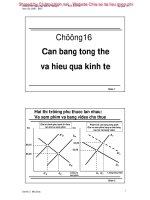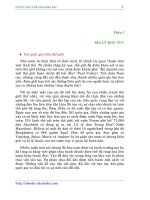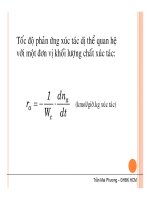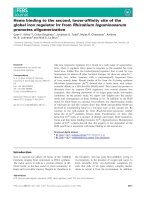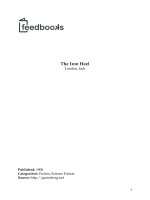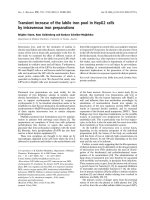The branding iron
Bạn đang xem bản rút gọn của tài liệu. Xem và tải ngay bản đầy đủ của tài liệu tại đây (739.83 KB, 173 trang )
TheProjectGutenbergEBookofTheBrandingIron,byKatharineNewlinBurt
ThiseBookisfortheuseofanyoneanywhereatnocostandwith
almostnorestrictionswhatsoever.Youmaycopyit,giveitawayor
re-useitunderthetermsoftheProjectGutenbergLicenseincluded
withthiseBookoronlineatwww.gutenberg.net
Title:TheBrandingIron
Author:KatharineNewlinBurt
ReleaseDate:June19,2008[EBook#25835]
Language:English
***STARTOFTHISPROJECTGUTENBERGEBOOKTHEBRANDINGIRON***
ProducedbyRogerFrankandtheOnlineDistributedProofreadingTeam
at
TheBrandingIron
TheBrandingIron
BY
KATHARINENEWLINBURT
GROSSET&DUNLAP
PUBLISHERSNEWYORK
BYARRANGEMENTWITHHOUGHTONMIFFLINCOMPANY
COPYRIGHT,1919,BYTHERIDGWAYCOMPANY
COPYRIGHT,1919,BYKATHARINEN.BURT
ALLRIGHTSRESERVED
CL
PRINTEDINTHEU.S.A.
CONTENTS
BookOne
THETWO-BARBRAND
I. JoanReadsbyFirelight
II. PierreLayshisHandonaHeart
III. TwoPicturesintheFire
IV. TheSin-Buster
PierreBecomesAlarmedabouthis
V.
Property
PierreTakesStepstoPreservehis
VI.
Property
VII. TheJudgmentofGod
VIII. Delirium
IX. DriedRose-Leaves
X. ProsperComestoaDecision
XI. TheWholeDutyofWoman
XII. AMatterofTaste
XIII. TheTrainingofaLeopardess
XIV. JoanRunsAway
3
12
21
25
32
42
51
56
61
72
80
91
100
105
XV. NervesandIntuition
XVI. TheTallChild
XVII. ConcerningMarriage
116
124
133
BookTwo
THEESTRAY
I. AWildCat
II. Morena’sWife
III. Jane
IV. Flight
V. Luck’sPlay
VI. JoanandProsper
VII. Aftermath
VIII. AgainsttheBars
IX. GrayEnvelopes
X. TheSpider
XI. TheCleanWildThing
XII. TheLeopardess
XIII. TheEndoftheTrail
TheBrandingIron
BookOne
THETWO-BARBRAND
TheBrandingIron
BOOKONE:TheTwo-BarBrand
151
161
170
182
191
205
215
227
236
255
266
284
300
CHAPTERI
JOANREADSBYFIRELIGHT
Thereisnosilencesofearful,sobreathless,sosearchingasthenightsilenceofa
wildcountryburiedfivefeetdeepinsnow.Forthirtymilesorso,north,south,
east,andwestofthesmall,half-smotheredspeckofgoldinPierreLandis’scabin
window, there lay, on a certain December night, this silence, bathed in
moonlight.Thecoldwasintense:belowthebenchwherePierre’shomesteadlay,
thererosefromthetwisted,rapidriver,acloudofsteam,abovewhichthehoarfrostedtopsofcottonwoodtreeswereperfectlydistinct,trunk,branch,andtwig,
againstaskythecolorofirispetals.Thestarsflaredbrilliantly,hardlydimmed
bythefullmoon,andoverthevastsurfaceofthesnowminutecrystalskeptupa
steady shining of their own. The range of sharp, wind-scraped mountains,
uplifted fourteen thousand feet, rode across the country, northeast, southwest,
dazzlinginwhitearmor,spearsuptothesky,asight,seensuddenly,totakethe
breath,likethecrashingmarchofarchangelsmilitant.
In the center of this ring of silent crystal, Pierre Landis’s logs shut in a little
squareofwarmandruddyhumandarkness.Joan,hiswife,madetheheartofthis
defiantspace—Joan,theonemindlivinginthisghostlyareaofnight.Shehad
putoutthelamp,forPierre,startingtownwardtwodaysbefore,hadwarnedher
withacertainthreateningsharpnessnottowasteoil,andshelayonthehearth,
herroughheadalmostintheashes,readingabookbytheunsteadylightofthe
flames.Shefollowedtheprintedlineswithastrong,darkforefingerandherlips
framedthewordswithslow,whisperingmotions.Itwasalong,strongwoman’s
body stretched there across the floor, heavily if not sluggishly built, dressed
rudelyinwarmstuffsandclumsyboots,anditwasaheavyface,too,unlitfrom
within,butbuiltonlinesofperfectanimalbeauty.Theheadandthroathadthe
massive look of a marble fragment stained to one even tone and dug up from
Attic earth. And she was reading thus heavily and slowly, by firelight in the
midstofthistremendousNorthernnight,Keats’sversionofBoccaccio’s“Taleof
IsabellaandthePotofBasil.”
Thestoryforsomereasoninterestedher.Shefeltthatshecouldunderstandthe
love of young Lorenzo and of Isabella, the hatred of those two brothers and
Isabella’s horrible tenderness for that young murdered head. There were even
thingsinherownlifethatshecomparedwiththese;infact,ateveryphrase,she
stopped, and, staring ahead, crudely and ignorantly visualized, after her own
experience,whatshehadjustread;and,indoingso,shepicturedherownlife.
HerloveandPierre’s—herlifebeforePierrecame—toputherselfinIsabella’s
place, she felt back to the days before her love, when she had lived in a
desolationofbleakpoverty,upandawayalongLoneRiverinherfather’sshack.
ThisloghouseofPierre’swasacastlebycontrast.JohnCarverandhisdaughter
hadsharedoneroombetweenthem;Joan’sbedcurtainedoffwithgunny-sacking
inacorner.Shesleptonhidesandrolledherselfupinolddingypatchworkquilts
andwornblankets.Onwintermorningsshewouldwakecoveredwiththesnow
thathadsiftedinbetweentheill-matchedlogs.Therehadbeenastove,oneleg
gone and substituted for by a huge cobblestone; there had been two chairs, a
long box, a table, shelves—all rudely made by John; there had been guns and
trapsandsnowshoes,hides,skins,thewingsofbirds,acoupleoffishing-rods—
Johnmadehislivingbylegalandillegaltrappingandkilling.Hehadlookedlike
atrappedorhuntedcreaturehimself,small,furtive,verydark,withlongfingers
alwaysworkingoverhismouth,agreatcrookednose—ahideousman,surelya
hideous father. He hardly ever spoke, but sometimes, coming home from the
town which he visited several times a year, but to which he had never taken
Joan,hewouldsitdownoverthestoveandgooverheavily,forJoan’sbenefit,
thestoryofhiscrimeandhisescape.
Joanalwaystoldherselfthatshewouldnotlisten,whateverhesaidshewould
stopherears,butalwaysthestoryfascinatedher,heldher,eyeswidenedonthe
figure by the stove. He had sat huddled in his chair, gnomelike, his face
contorting with the emotions of the story, his own brilliant eyes fixed on the
round,redmouthofthestove.Thereflectionofthisscarletcirclewashideously
noticeableinhispupils.
“A man’s a right to kill his woman if she ain’t honest with him,” so the story
began;“ifhefindsoutshe’sbentrickin’ofhim,playin’himoffferanotherman.
Thatwasyermother,gel;shewasabadwoman.”Therefollowedacoarseand
vividdescriptionofherbadnessandthemannerofit.“Thatkinderthingnoman
canletpassbyinhiswife.Ifoundher”—againtherudedetailsofhisdiscovery
—“an’Ifoundhim,an’Ilethimgoferthewhite-liveredcowardhewas,buther
Ikilled.Ishotherdeadaftershe’dsaidherprayersan’askedGod’smercyonher
soul.ThenIwalkedoff,buttheykotchedmean’Iwastried.Theydidn’tswing
me. Out in them parts they knowed I was in my rights; so the boys held, but
’twas a life sentence. They tuk me by rail down to Dawson an’ I give ’em the
slip,handcuffsan’all.Perhaps’twasonlyahalf-heartedchasetheymadeferme.
Some of them fellers mebbe had wives of their own.” He always stopped to
laughatthispoint.“An’IcutoffupcountrytillIcometoasmithyattheedgeof
atown.Ihungroundferaspelltillthesmithhedgoneoffan’Igotintohisplace
an’ridmeofthehandcuffs.’Twasajob,butIwasn’tkotchedatitan’Imade
myself free.” Followed the story of his wanderings and his hardships and his
comingtoLoneRiverandsettingouthistraps.“Inthemdaysthereweren’tno
lawag’in’trappin’beaver.Amancouldmakeahonestlivin’.Nowthey’vetuk
an’ made laws ag’in’ a man’s bread an’ butter. I ask ye, if ’t ain’t wrong on a
Tuesdaytotrapyerbeaver,why,’tain’twrongthefollerin’Tuesday.Idon’tsee
it,jesbecossomefellersbacktherehasmadealawag’in’ittosuittheirselves.
Anyway,themarketferbeaverhidesisstillprime.MebbeI’llleaveyouafortin,
gel.I’vesavedyoufrombadness,anyhow.Iriskedalottogobackan’gityou,
butIdoneit.Youwasplayin’outinfrontofyeraunt’shousean’Icomeferyou.
Youwasathree-year-oldan’abigyoungster.SaysI,‘What’syername?’Says
you,‘JoanCarver’;an’Iknowedyoubyyerlikenesstoher.ByGod!IsworeI’d
saveye.Itukyouoffwithme,thoughyouputupafightan’Ihedtouseyou
roughtosilenceyou.‘Thereain’ta-goin’tobenomaninyerlife,JoanCarver,’
saysI;‘youan’yerbigeyesisa-goin’tobeferme,todomyworkan’tolook
aftermycomforts.Noprettyboysferyouan’nohusbandseithertogoa-shootin’
ofyoudownferyersins.’”Heshiveredandshookhishead.“No,hereyoustays
withyerfatheran’growsupagoodgel.Thereain’ta-goin’tobenomaninyer
life,Joan.”
But youth was stronger than the man’s half-crazy will, and when she was
seventeen,Joanranaway.
Shefoundherwayeasilyenoughtothetown,forshewaswiseinthetracksofa
wildcountry,andJohn’strailtownwards,thoughsorarelyused,wastohereyes
plain enough; and very coolly she walked into the hotel, past the group of
loungersaroundthestove,andaskedatthedesk,whereMrs.Uppersat,ifshe
couldgetajob.Mrs.Upperandtheloungersstared,fortherewerefewwomen
inthisfrontiercountryandthosefewwerewellknown.Thisgreat,stronggirl,
heavily graceful in her heavily awkward clothes, bareheaded, shod like a man,
her face and throat purely classic, her eyes gray and wide and as secret in
expressionasanuntamedbeast’s—noonehadeverseenthelikeofherbefore.
“What’syername?”askedMrs.Uppersuspiciously.ItwasMormonDayinthe
town; there were celebrations and her house was full; she needed extra hands,
butwherethiswildcreaturewasconcernedshewasdoubtful.
“Joan.I’mJohnCarver’sdaughter,”answeredthegirl.
At once comprehension dawned; heads were nodded, then craned for a better
look. Yes, the town, the whole country even, had heard of John Carver’s
imprisoneddaughter.Soberanddrunk,hehadboastedofherandofhowthere
wastobe“noman”inherlife.Itwaslikedanglingripefruitabovethemouths
ofhungryboystomakesuchaboastinsuchaland.Buttheywerelazy.Itwasa
countryoflazy,slow-thinking,slow-moving,andslow-talkingadventurers—you
willnoticethisponderous,inevitablequalityofrollingstones—andthoughmen
talkedwithhumornottoofineof“travelin’upLoneRiverforJohn’sgel,”nota
manhadgotthere.PerhapsthemenknewJohnCarverforacoward,thatmost
dangerousanimaltomeetinhisownlair.
Now here stood the “gel,” the mysterious secret goal of desire, a splendid
creature,virginal,savage,ascertainlydesignedformanasEve.Themen’seyes
fasteneduponher,movedanddropped.
“Yourfathersentyoudownhereferajob?”askedMrs.Upperincredulously.
“No.Icome.”Joan’sgravegazewasunchanging.“I’mtiredofitupthere.Iain’t
a-goin’back.I’mmosteighteennowan’Ikinderwantachange.”
She had not meant to be funny, but a gust of laughter rattled the room. She
shrank back. It was more terrifying to her than any cruelty she had fancied
meeting her in the town. These were the men her father had forbidden, these
loud-laughing, crinkled faces. She had turned to brave them, a great surge of
colorinherbrows.
“Don’t mind the boys, dear,” spoke Mrs. Upper. “They will laff, joke or none.
Weain’tnoneofusblamin’you.It’sawonderyouain’trunofflongaforenow.I
cangiveyouajoban’welcome,butyou’llbegreenan’unhandy.Well,sir,we
kinlearnye.Youkinturnyerhandtochamber-workan’mebbehelpatthetable.
Maudwillshowyou.But,Joan,whatwilldaddotoyou?He’llbetakin’after
youhot-foot,Ireckon,an’befergettin’youbackhomeassoonashecan.”
Joandidnotchangeherlook.
“I’llnotbegoin’backwithhim,”shesaid.
Herslow,deepvoice,chestnotesofamusicalvibration,stirredtheroom.The
menwerehersandgrufflysaidso.Asuddenwarmthenvelopedherfromheartto
foot.ShefollowedMrs.Uppertotheinitiationinherservice,clothedforthefirst
timeinhumansympathies.
CHAPTERII
PIERRELAYSHISHANDONAHEART
MaudUpperwasthefirstgirlofherownagethatJoanhadeverseen.Joanwent
in terror of her and Maud knew this and enjoyed her ascendancy over an
untamedcreaturetwicehersize.Therewasthecrackofalion-tamer’swhipin
thetoneofherinstructions.Thatwasafteradayortwo.AtfirstMaudhadbeen
horribly afraid of Joan. “A wild thing like her, livin’ off there in the hills with
thatman,why,ma,there’snotellin’whatshemightbedoin’tome.”
“She won’t hurt ye,” laughed Mrs. Upper, who had lived in the wilds herself,
havingbeenafrontierman’swifebeforethedaysevenofthisfrontiertownand
havingmarriedthehotel-keeperasasecondventure.Sheknewthatcivilization
—thisrudeplacebeingcivilizationtoJoan—wouldcowthegirlandsheknew
that Maud’s self-assertive buoyancy would frighten the soul of her. Maud was
large-hipped, high-bosomed, with a small, round waist much compressed. She
carried her head, with its waved brown hair, very high, and shot blue glances
downalongashort,broadnose.Hermouthwasthinanddetermined,hercolor
high. She had a curiously shallow, weak voice that sounded breathless. She
taughtJoanimpatientlyandlaughedloudlybutnotunkindlyatherways.
“Gee, she’s awkward, ain’t she?” she would say to the men; “trail like a bull
moose!”
Themengrinned,buttheireyesfollowedJoan’smovements.Asamatteroffact,
she was not awkward. Through her clumsy clothes, the heaviness of her early
youth,inspiteofallthefettersofherignorance,herwonderfullongbonesand
herwonderfulstrengthassertedthemselves.Andsheneverhurried.Atfirstthis
apparent sluggishness infuriated Maud. “Get a gait on ye, Joan Carver!” she
wouldscreamabovethedinoftheroughmeals,butsoonshefoundthatJoan’s
slow movements accomplished a tremendous amount of work in an amazingly
shorttime.Therewasnopauseinthegirl’sactivity.Shepouredoutherstrength
asapythonpourshis,noiselessly,evenly,steadily,nohaste,nowaste.Andthe
men’seyesbroodeduponher.
If Joan had stayed long at Mrs. Upper’s, she would have begun inevitably to
modelherselfonMaud,whowas,inhereyes,amarvelousthingofbeauty.But,
just a week after her arrival, there came to the inn Pierre Landis and for Joan
beganthestrangeandterriblehistoryoflove.
In the lives of most women, of the vast majority, the clatter and clash of
housewiferypreludeandpostludethespringsongoftheiryears.Andtherattleof
dishes,ofbusyknivesandforks,thequicktappingofMaud’sattendantfeet,the
sound of young and ravenous jaws at work: these sounds were in Joan’s
bewilderedears,andthesightswhichtheyaccompaniedinherbewilderedeyes,
justbeforesheheardPierre’svoice,justbeforeshesawhisface.
It was dinner hour at the hotel, an hour most dreadful to Joan because of the
hurry,thestrangeness,andthecrowd,becauseoftheresponsibilityofherwork,
butchieflybecauseatthathoursheexpectedtheappearanceofherfather.Her
eyes were oftenonthedoor.It opened to admit theyoungmen,the ridersand
rancherswhohunguptheirhats,swaggeredwithalittlejingleofspurstotheir
chairs;clean-faced,clean-handed,wet-haired,murmuringlow-voicedcourtesies,
—“Passmethegravy,please,”“Iwouldn’tbecarin’ferany,thankyou,”—and
liftingtothefacesofwaitinggirlsnowandagaintheirstrange,young,brooding
eyes,bold,laughing,andafraid,hungry,pathetic,arrogant,astheeyesofyoung
menare,tamelessanduntamable,butfullofthepathosoftheuntamed.Joan’s
heartshookalittleundertheirlooks,butwhenPierreliftedhiseyestoher,her
heartstoodstill.Shehadnotseenthemfollowingherprogressaroundtheroom.
Hehadcomeinlate,andfindingnoplaceatthelong,centraltablesatapartata
smalleroneunderahigh,uncurtainedwindow.Bythetimeshemethiseyesthey
werechargedwithlight;smoky-blueeyestheywere,theirisheavilyringedwith
black, the pupils dilated a little. For the first time it occurred to Joan, looking
downwithastillheartintohiseyes,thatamanmightbebeautiful.Theblood
cameupfromherhearttoherface.Hereyesstruggledawayfromhis.
“What’syername,gel?”murmuredPierre.
“JoanCarver.”
“Yourunawayfromhome?”Hetoohadheardofher.
“Yes.”
“Willyourfatherbetakin’youback?”
“Iwon’tbegoin’withhim.”
She was about topasson.Pierrecasta swiftlookaboutthetable—bentheads
and busy hands, eyes cast down, ears, he knew, alert. It was a land of few
womenandofmanymen.Hemustleaveinthemorningearlyandformonthshe
wouldnotbeback.Heputoutalong,hardhand,caughtJoan’swristandgaveit
aqueer,urgentshake,thegestureofanimpatientandbeseechingchild.
“Willyoubecomin’homewithme,gel?”askedPierrehurriedly.
Shelookedathim,herlipsapart,andsheshookherhead.
Maud’svoicescreamedatherfromthekitchendoor.Pierrelethergo.Shewent
on,verywhite.
Shedidnotsleepatallthatnight.Herfather’sface,Pierre’sface,lookedather.
InthemorningPierrewouldbegone.ShehadheardMaudsaythatthe“queer
Landisfellerwouldbemakin’tracksbacktothatranchofhisacrosttheriver.”
Yes,hewouldbegone.Shemighthavebeengoingwithhim.Shefelttheurgent
pressureofhishandonherarm,inherheart.Itshookherwithsuchalongingfor
love,foralltheunknownlargesseoflove,thatshecried.Thenextmorning,pale,
she came down and went about her work. Pierre was not at breakfast, and she
feltasinkingofheart,thoughshehadnotknownthatshehadbuiltuponseeing
himagain.Then,asshesteppedoutatthebacktoemptyabucket,therehewas!
Not even the beauty of dawn could lend mystery to the hideous, littered yard,
untidy as the yards of frontier towns invariably are, to the board fence, to the
trampled half-acre of dirt, known as “The Square,” and to the ugly frame
buildings straggled about it; but it could and did give an unearthly look of
blessednesstothebare,gray-brownbuttesthatringedthetownandaglorytothe
sky,whileuponPierre,waitingathispony’shead,itshedamagicalandtender
light. He was dressed in his cowboy’s best, a white silk handkerchief knotted
under his chin, leather “chaps,” bright spurs, a sombrero on his head. His face
wasgrave,excited,wistful.AtsightofJoan,hemovedforward,theponytrailing
afterhimatthefulllengthofitsreins;and,stoppingbeforeher,Pierretookoff
the sombrero, slowly stripped the gauntlet from his right hand, and, pressing
both hat and glove against his hip with the left hand, held out the free, clean
palmtoJoan.
“Good-bye,”saidhe,“unless—you’llbecomin’withmeafterall?”
Joanfeltagainthatrushoffiretoherbrows.Shetookhishandandherfingers
closedarounditlikethefrightened,lonelyfingersofalittlegirl.Shecamenear
tohimandlookedup.
“I’llbecomin’withyou,Pierre,”shesaid,justaboveherbreath.
Heshotupafullinch,stiffened,searchedherwithsmoulderingeyes,thenheld
herhardagainsthim.“You’llnotbesorry,JoanCarver,”saidhegentlyandput
herawayfromhim.Then,unsmiling,hebadehergoinandgetherbelongings
whilehegotherahorseandtoldhisnewstoMrs.Upper.
ThatridewasdreamliketoJoan.Pierreputherinhersaddleandsherodeafter
himacrosstheSquareandalongaroadflankedbytheuglyhousesofthetown.
“Wherearewea-goin’?”sheaskedhimtimidly.
He stopped at that, turned, and, resting his hand on the cantle of his saddle,
smiledatherforthefirsttime.
“Don’tyousavvytheanswertothatquestion,Joan?”
Sheshookherhead.
Thesmilefaded.“We’regoin’tobemarried,”saidhesternly,andtheyrodeon.
They were married by the justice, a pleasant, silent fellow, who with Western
courtesy, asked no more questions than were absolutely needful, and in fifteen
minutesJoanmountedherhorseagain,aringonthethirdfingerofherlefthand.
“Now,”saidPierre,standingatherstirrup,hisshining,smoke-blueeyesliftedto
her,hishandonherboot,“you’llbewantin’somethings—someclothes?”
“No,”saidJoan.“Maudwentwithmean’helpedmebuythingswithmypayjust
yesterday.Iwon’tbeneedin’anything.”
“Allright,”saidhe.“We’reoff,then!”Andheflunghimselfwithasuddenwild,
boyish “Whoopee!” on his pony, gave a clip to Joan’s horse and his own, and
awaytheygalloped,apairof young,wildthings,outfromthe townthrougha
stragglingstreettowheretheroadboldlystretcheditselftowardagreatlandof
sagebrush, of buttes humping their backs against the brilliant sky. Down the
valley they rode, trotting, walking, galloping, till, turning westward, they
mountedasharpslopeandcameupabovetheplain.Below,intheheartofthe
long, narrow valley, the river coiled and wandered, divided and came together
again into a swift stream, amongst aspen islands and willow swamps. Beyond
thisstrange,lonelyriver-bed,thecottonwoodsbegan,and,abovethem,thepine
forestsmassedthemselvesandstrodeupthefoothillsofthegiganticrange,that
rangeofironrocks,sharp,thin,andbrittlewheretheyscrapedthesky.
Atthetopofthehill,PierreputouthishandandpulledJoan’srein,drawingher
toastopbesidehim.
“Overyonder’smyranch,”saidhe.
Joan looked. There was not a sign of house or clearing, but she followed his
gestureandnodded.
“Underthemountains?”shesaid.
“At the foot of Thunder Cañon. You can see a gap in the pines. There’s a
waterfall just above—that white streak. Now you’ve got it. Where you come
from’stothesouth,awayyonder.”
Joanwouldnotturnherhead.“Yes,”saidshe,“Iknow.”
Suddenlytearsrushedtohereyes.Shehadamomentofunbearablelongingand
regret.Pierresaidnothing;hewasnotwatchingher.
“Comeon,”saidhe,“oryourfatherwillbetakin’afterus.”
Theyrodeatagallopdownthehill.
CHAPTERIII
TWOPICTURESINTHEFIRE
The period which followed had a quality of breathless, almost unearthly
happiness.Theywereyoung,savage,simple,andtheirlove,unanalyzed,wasas
joyousasthelovesofanimals:joyouswiththatcleargravitycharacteristicofthe
boyandgirl.PierrehadbeenterriblyalonebeforeJoancame,andthebuildingupofhisranchhadoccupiedhisminddayandnightexcept,nowandagain,for
dreams.Yethewasofapassionatenature.Joanfeltinhimsometimesasavage
possibilityofviolence.Twoincidentsofthistimeblazedthemselvesespecially
onhermemory:theone,herfather’svisit,theother,anirrelevantenoughpicture
untilaftereventsthrewbackaglareuponit.
TheyhadbeenatPierre’sranchforafortnightbeforeJohnCarverfoundthem.
Then,onemorning,asPierreopenedthedoortogoouttowork,Joansawathin,
redponytiedtothefenceandasmallfigurewalkingtowardthecabin.
“Pierre,it’sFather!”shesaid.AndPierrestoppedinhistracks,drewhimselfup
andwaited,handsonhiscartridgebelt.
How mean and old and furtive her father looked in contrast to this beautiful
young husband! Joan was entirely unafraid. She leaned against the side of the
door and watched, as silent and unconsulted as any squaw, while the two men
settledtheirpropertyrightsinher.
“So you’ve took my gel,” said John Carver, stopping a foot or two in front of
Pierre,hiseyesshiftingupanddown,onelonghandfingeringhislips.
Pierreansweredcourteously.“Somemanwasboundtohevher,Mr.Carver,soon
orlate.Youcan’tsetyourfaceag’in’thelawsofnatur’.Willyoubesteppin’in?
Joanwillgiveyousomebreakfast.”
Carverpaidnoheedtotheinvitation.“Hevyoumarriedher?”saidhe.
ThebloodrosetoPierre’sbrownface.“SureIhev.”
“Well, sir, you hev married the darter of a ——” Carver used a brutal word.
“Lookoutferher.Ifyouseehereyeslookin’an’lookin’atanotherman,youkin
know what’s to come.” Pierre was white. “I’ve done with her. She kin never
come to me fer bite or bed. Shoot her if you hev to, Pierre Landis, but when
she’skotchedathermother’sgame,don’tsendherbacktome.That’sallIcome
tosay.”
Heturnedwithlimberagilityandwentbacktohishorse.Hewasonitandoff,
galloping madly across the sagebrush flat. Pierre turned and walked into the
housepastJoanwithoutaword.
Shestillleanedagainstthedoor,butherheadwasbent.
Presentlyshewentaboutherhousework.Everynowandthensheshotawistful
look at Pierre. All morning long, he sat there, his hands hanging between his
knees, his eyes full of a brooding trouble. At noon he shook his head, got up,
and,stillwithoutwordorcaress,hestrodeoutanddidnotcomebacktilldark.
Joan suffered heartache and terror. When he came, she ran into his arms. He
kissed her, seemed quite himself again, and the strange interview was never
mentionedbyeitherofthem.Theyweresilentpeople,giventofeelingsandto
actionratherthantothoughtsandwords.
TheothermemorywasofacertainsunsethourwhenshecameatPierre’scall
out to the shed he had built at one side of their cabin. Its open side faced the
west, and, as Joan came, her shadow went before her and fell across Pierre at
work. The flame of the west gave a weird pallor to the flames over which he
bent.Hewaswhistling,andhammeringatalongpieceofiron.Joancameand
stoodbesidehim.
Suddenlyhestraightenedupandheldintheairabarofmetal,theshapedend
whitehot.Joanblinked.
“That’s our brand, gel,” said Pierre. “Don’t you fergit it. When I’ve made my
fortunethere’llbestockalloverthecountrymarkedwiththemtwobars.That’ll
befamous—theTwo-BarBrand.Don’tyoufergitit,Joan.”
Andhebroughtthewhiteironclosesothatshefeltitsheatonherfaceanddrew
back, flinching. He laughed, let it fall, and kissed her. Joan was very glad and
proud.
CHAPTERIV
THESIN-BUSTER
In the fall, when the whole country had turned to a great cup of gold, purplerimmedunderthesky,Pierrewentoutintothehillsafterhiswintermeat.Joan
was left alone. She spent her time cleaning and arranging the two-room cabin,
and tidying up outdoors, and in “grubbing sagebrush,” a gigantic task, for the
onehundredandfiftyacresofPierre’shomesteadwerecoveredforthemostpart
bythesturdy,spicygrowth,andeverybushhadtobedugoutandburnttoclear
the way for ploughing and planting. Joan worked with the deliberateness and
intentnessofaman.Sheenjoyedthewholesomedrudgery.Shewasproudevery
sundown of the little clearing she had made, and stood, tired and content, to
watchthepiledbrushburn,sendinguparomaticsmokeandcurious,dullflames
veryhighintothestillair.
She was so standing, hands folded on her rake, when, on the other side of her
conflagration,sheperceivedaman.Hewassteadilyregardingher,andwhenher
eyes fell upon him, he smiled and stepped forward—a tall, broad, very fair
youngmaninashootingcoat,khakiriding-breeches,andputtees.Hehadawide
brow,clear,blueeyesandaneager,sensitive,clean-shavenmouthandchin.He
heldoutabigwhitehand.
“Mrs.Landis,”hesaid,inacrispvoiceofanaccentandfinishstrangetothegirl
“I wonder if you and your husband can put me up for the night. I’m Frank
Holliwell.I’monaroundofparishvisits,and,asmyparishisaboutsixtymiles
square,mypooroldponyhasgonelame.Iknowyouarenotmyparishioners,
though,nodoubt,youshouldbe,butI’mgoingtolayclaimtoyourhospitality,
forallthat,ifImay?”
Joan had moved her rake into the grasp of her left hand and had taken the
profferedpalmintoherother,allwarmandfragrantlystained.
“You’rethenewsin-buster,ain’tyou?”sheaskedgravely.
Theyoungmanopenedhisblueandfriendlyeyes.
“Oh, that’s what I am, eh? That’s a new one to me. Yes. I suppose I am. It’s
rather a fine name to go by—sin-buster,” and he laughed very low and very
amusedly.
Joanlookedhimoverandslowlysmiled.“Youlooklikeyoucouldbustanything
you’damindto,”shesaid,andledthewaytowardthehouse,herrakeacrossher
shoulder.
“Pierre,”shetoldhimwhentheywereintheshining,cleanloghouse,“isoffin
thehillsafterhiselk,butIcanmakeyouupabedinthesettin’-rooman’serve
youasupperan’welcome.”
“Oh,thanks,”heratherdoubtfullyaccepted.
Evidentlyhedidnotknowthewaysandproprietiesofthisnew“parish”ofhis.
ButJoanseemedtotakethesituationwithanenormouscalmimpersonality.He
modeledhismanneruponhers.Theysatatthetabletogether,Joansilent,save
when he forced her to speak, and entirely untroubled by her silence, Frank
Holliwell eating heartily, helping her serve, and talking a great deal. He asked
her a great many questions, which she answered with direct simplicity. By the
endofdish-washing,hehadherhistoryandmoreofheropinions,probably,than
anyothercreatureshehadmet.
“WhatdoyoudowhenLandisisaway?”
Shetoldhim.
“But,intheevenings,Imean,afterwork.Haveyoubooks?”
“No,”saidJoan;“it’srighthardlabor,readin’.Palearnedmemylettersan’Ican
spelloutbitsfrompapersan’advertisementsan’whatnot,butIain’tneverread
abookstraightout.Idunno,”sheaddedpresently,“butasI’dliketo.Pierrecan
read,”shetoldhimproudly.
“I’msureyou’dliketo.”Heconsideredherthroughthesmokeofhispipe.He
wassittingbythehearthnow,andshe,justthroughwithclearingup,stoodby
thecornerofthemantelshelf,arrangingthelogs.Thefirelightdancedoverher
face,sobeautiful,sounlightedfromwithin.
“How old are you, Joan Landis?” he asked suddenly, using her name without
titleforthefirsttime.
“Eighteen.”
“Isthatall?Youmustreadbooks,youknow.There’ssomuchemptyspacethere
backofyourbrows.”
Shelookedupsmilingalittle,herwidegrayeyespuzzled.
“Yes,Joan.Youmustread.Willyou—ifIlendyousomebooks?”
Sheconsidered.“Yes,”shesaid.“I’dreadthemifyou’dbelendin’mesome.In
the evenings when Pierre’s away, I’m right lonesome. I never was lonesome
before,nottoknowit.It’lltakemealongtimetoreadonebook,though,”she
addedwithanengagingmournfulness.
“Whatdoyoulike—stories,poetry,magazines?”
“I’dlikerealbooksinstiffcovers,”saidJoan,“an’Idon’tlikepictures.”
Thissurprisedtheclergyman.“Whynot?”saidhe.
“Iliketonotionhowthefolkslookmyself.Ilikepicturesofrealplaces,thathas
gottobeliketheyare”—Joanwastalkingagreatdealandhavingtroublewith
her few simple words—“but I like folks in stories to look like I want ’em to
look.”
“Notthewaythewriterdescribesthem?”
“Yes,sir.Butyoucanmakeupawholelotonwhatthewriterdescribes.Ifhe
says‘hereyesisblue’;youcansee’emdarkblueorlightblueorjestblue.An’
youcansee’emshapedroundorwhatnot,thewayyouthinkaboutfolksthat
you’veheardofan’havenevermet.”
It was extraordinary how this effort at self-expression excited Joan. She was
rarely self-conscious, but she was usually passive or stolid; now there was a
brilliantflushinherfaceandherlargeeyesdeepenedandglowed.“Iheerdtell
ofyou,Mr.Holliwell.FellerscomeupheretoseePierreonceinawhilean’one
ortwoof’emspokeyourname.An’Ikinderfiguredoutyouwasaweedyfeller,
awfulsolemn-like,an’ofcourseyouain’t,butit’srealhardformetonotionthat
thereain’ttwoMr.Holliwells,youan’theweedysin-busterI’vebenpicturin’.
LikeasnotI’llgettothinkin’ofyouliketwofellers.”Joansighed.“Seemslike
whenIonctgetanotioninmyheaditjeststickstheresomeway.”
“Thenthemorewisenotionsyougetthebetter.I’llrideuphereinacoupleof
weeks’ time with some books. You may keep them as long as you will. All
winter, if you like. When I can get up here, we can talk them over, you and
LandisandI.I’lltrytochoosesomewithoutpictures.Therewillbestoriesand
somepoetry,too.”
“Iain’tneverreadbutonepome,”saidJoan.
“Andthatwas?”
She had sat down on the floor by the hearth, her head thrown back to lean
against the cobbles of the chimney-piece, her knees locked in her hands. That
magnificent long throat of hers ran up to the black coils of hair which had
slipped heavily down over her ears. The light edged her round chin and her
strongly modeled, regular features; the full, firm mouth so savagely pure and
sensuousandself-contained.Theeyesweremysteriousundertheirthicklashes
anddark,longbrows.Thisthroatandfaceandthesestronghandswerepicked
out in their full value of line and texture from the dark cotton dress she was
wearing.
“It’s a pome on a card what father had, stuck ag’in’ the wall.” She began to
recite, her eyes fixed upon him with childlike gravity. “‘He maketh me to lie
down in green pastures: He leadeth me beside the still waters.... Yea, though I
walkthroughthevalleyofshadows,thouartwithme,thyrodandthystaffthey
comfortme.’”
Holliwell had taken the pipe from between his teeth, had straightened up. Her
deepvoice,theslightswingingofherbodytotherhythmshehadunconsciously
giventoherlines,thestrangeglowinhereyes...Holliwellwonderedwhythese
things,thisbrief,sing-songrecitation,hadgivenalightthrilltothesurfaceofhis
skin,hadsentatinglingtohisfingertips.Hewasthefirstpersontowonderat
that effect of Joan’s cadenced music. “The valley of the shadow—” she had
missedafamiliarphraseandaddedvaluetoatoooftenrepeatedline.
“Joan! Joan!” said the “sin-buster,” an exclamation drawn from him on a deep
breath,“whatanextraordinarygirlyouare!Whatamarvelouswomanyouare
goingtobe!”
Joan looked at him in a silence of pure astonishment and that was the end of
theirrealtalk.
CHAPTERV
PIERREBECOMESALARMEDABOUTHISPROPERTY
The next time Holliwell came, he brought the books, and, finding Pierre at
home,hesatwithhishostaftersupperandtalkedmen’stalkofthecountry;of
game, of ranching, a little gossip, stories of travel, humorous experiences, and
Joansatinherplace,thebooksinherlap,lookingandlistening.
JohnCarverhadusedaphrase,“Whenyouseehereyeslookin’andlookin’at
another man—” and this phrase had stuck in Pierre’s sensitive and jealous
memory. What Joan felt for Holliwell was a sort of ignorant and respectful
tenderness,theexcitementofanintelligentchildfirstmovedtoaknowledgeof
itsownintelligence;thegratitudeofsavagelonelinesstowardthebeautifulfeet
ofexploration.Aconsciousnessofhercleanmind,aconsciousnessofheryoung,
untamedspirit,hadcomeslowlytolifeinhersincehertalkwithHolliwell.Joan
waspeculiarlyawoman—thatis,thepassiveandreceptivebeing.Pierrehadlaid
hishandonherheartandshehadfollowedhim;nowthisyoungparsonhadputa
curiousfingeronherbrain,itfollowedhim.Herhusbandsawtheadmiration,the
gratitude,thetenderexcitementinherfrankeyes,andthepoisonseedsownby
JohnCarver’shandshotoutrootsandtiny,deadlybranches.
But Joan and Holliwell were unaware. Pierre smoked rapidly, rolling cigarette
aftercigarette;helistenedwithacourteousair,hetoldstoriesinhissoft,slow
voice; once he went out to bring in a fresh log and, coming back on noiseless
feet,sawJoanandherinstructorbentoveroneofthebooksandJoan’sfacewas
almostthatofastranger,soeager,soflushed,withsparklesintheusuallystill,
grayeyes.
It was not till a week or two after this second visit from the clergyman that
Pierre’ssmoulderingjealousybrokeintoflame.Afterclearingawaythesupper
thingswithanabsentairofeagerexpectation,Joanwoulddryherhandsonher
apron,and,takingdownoneofherbooksfromtheirplaceinashelfcorner,she
would draw her chair close to the lamp and begin to read, forgetful of Pierre.
These had been the happiest hours for him; he would tell Joan about his day’s
work, about his plans, about his past life; wonderful it was to him, after his
loneliness,thatsheshouldbesittingtheredrinkingineverywordandlovinghim
with her dumb, wild eyes. Now, there was no talk and no listening. Joan’s
absorbedfacewasturnedfromhimandbentoverherbook,herlipsmoved,she
wouldstopandstarebeforeher.Afteralongwhile,hewouldgetupandgoto
bed,butshewouldstaywithherbookstillarestlessmovementfromhimwould
make her aware of the lamplight shining wakefulness upon him through the
chinks in the partition wall. Then she would get up reluctantly, sighing, and
cometobed.
For ten evenings this went on, Pierre’s heart slowly heating itself, until, all at
once,theflameleaped.
Joanhaduntiedherapronandreachedupforherbook.Pierrehadbeenwaiting,
hoping that of her free will she might prefer his company to the “parson
feller’s”—for in his ignorance those books were jealously personified—but,
withoutaglanceinhisdirection,shehadturnedasusualtotheshelf.
“Yougoin’toread?”askedPierrehoarsely.Itwasapainfulefforttospeak.
Sheturnedwithachildishlookofastonishment.“Yes,Pierre.”
He stood up with one of his lithe, swift movements, all in one rippling piece.
“ByGod,you’renot,though!”saidhe,strodeovertoher,snatchedthevolume
fromher,threwitbackintoitsplace,andpointedhertoherchair.
“You set down an’ give heed to me fer a change, Joan Carver,” he said, his
smoke-colored eyes smouldering. “I didn’t fetch you up here to read parsons’
books an’ waste oil. I fetched you up here—to—” He stopped, choked with a
sudden,enormoushurttendernessandsatdownandfelltosmokingandstaring,
hot-eyed,intothefire.
And Joan sat silent in her place, puzzled, wistful, wounded, her idle hands
folded,lookingathimforawhile,thenabsentlybeforeher,andheknewthather
mind was busy again with the preacher feller’s books. If he had known better
how to explain his heart, if she had known how to show him the impersonal
eagerness of her awakening mind—! But, savage and silent, they sat there,
lovingeachother,hurt,butlockedeachintohisownimpenetrablelife.
After that, Joan changed the hours of her study and neglected housework and
sagebrush-grubbing,but,nonetheless,werePierre’seveningsspoiled.Perfection
of intercourse is the most perishable of all life’s commodities. Now, when he
talked, he could not escape the consciousness of having constrained his
audience;shecouldnotescapeherknowledgeofhisjealousy,theremembrance
ofhismysteriousoutbreak,theirrepressibletugofthestoryshewasreading.So
itwentontillsnowcameandtheywereshutin,manandwife,withonlyeach
other to watch, a tremendous test of good-fellowship. This searching intimacy
cameatabadtime,justafterHolliwell’sthirdvisitwhenhehadbroughtafresh
supplyofbooks.
“There’spoetrythistime,”hesaid.“GetPierretoreaditaloudtoyou.”
ThesuggestionwasmetbyarudelaughfromPierre.
“Iwouldn’tbewastin’mytime,”hejeered.
Itwasthefirstriftinhiscourtesy.Holliwelllookedupinsharpsurprise.Hesaw
aflashof thetruth,alittlewriggleof thegreen serpentinPierre’seyesbefore
theyfell.HeflushedandglancedatJoan.Shestoodbythetableinthecircleof
lamplight, looking over the new books, but in her eagerness there was less
simplicity.Sheworeanalmosttimorousair,acceptedhisremarksinsilence,shot
doubtfullooksatPierrebeforesheansweredquestions,wasanentirelydifferent
Joan. Now Holliwell was angry and he stiffened toward his host and hostess,
droppedallhis talkaboutthebooksandsmoked haughtily.Hewasyoungand
over-sensitive,nomoremasterofhimselfinthisinstancethanPierreandJoan.
But before he left after supper, refusing a bed, though Pierre conquered his
dislike sufficiently to urge it, Holliwell had a moment with Joan. It was very
touching. He would tell about it afterwards, but, for a long time, he could not
beartorememberit.
Shetriedtoreturnhisbooks,comingwithherarmsfullofthemandliftingup
eyesthatwerealmosttragicwithrenunciation.
“I can’t be takin’ the time to read them, Mr. Holliwell,” she said, that
extraordinary, over-expressive voice of hers running an octave of regret; “an’
somewayPierredon’tlikethatIshouldspendmyevenin’sonthem.Seemslike
he thinks I was settin’ myself up to be knowin’ more than him.” She laughed
ruefully.“Me—knowin’more’nPierre!It’slaughable.ButanywaysIdon’twant
himtobethinkin’that.Sotakethebooks,please.Ilikethem.”Shepaused.“I
lovethem,”shesaidhungrilyand,blinking,thrustthemintohishands.
He put them down on the table. “You’re wrong, Joan,” he said quickly. “You
mustn’tgiveintosuchafoolishidea.Youhaverightsofyourown,alifeofyour
own.Pierremustn’tstandinthewayofyourlearning.Youmustn’tlethim.I’ll
speaktohim.”
“Oh,no!”Someintuitionwarnedherofthedangerinhisdoingthis.
“Well,then,keepyourbooksandtalktoPierreaboutthem.Trytopersuadehim
toreadaloudtoyou.Ishan’tbebacknowtillspring,butIwantyoutoreadthis
winter,readallthestuffthat’sthere.Come,Joan,topleaseme,”andhesmiled
coaxingly.
“I ain’t afeared of Pierre,” said Joan slowly. Her pride was stung by the
suggestion.“I’llkeepthebooks.”Shesighed.“Good-bye.WhenIseeyouinthe
spring,I’llbearightlearnedschool-marm.”
She held out her hand and he took and held it, pressing it in his own. He felt
troubledabouther,unwillingtoleaveherinthesnowboundwildernesswiththat
youngsavageofthesmoulderingeyes.
“Good-bye,”saidPierrebehindhim.Hissoftvoicehadaclick.
Holliwell turned to him. “Good-bye, Landis. I shan’t see either of you till the
spring. I wish you a good winter and I hope—” He broke off and held out his
hand.“Well,”saidhe,“you’reprettyfaroutofeveryone’swayhere.Begoodto
eachother.”
“Damn your interference!” said Pierre’s eyes, but he took the hand and even
escortedHolliwelltohishorse.
Snowcameearlyanddeepthatwinter.Itfellforlong,graydaysandnights,and
thenitcameinhurricanesofdrift,wrappingthecabininswirlingwhitetillonly
one window peered out and one gabled corner cocked itself above the crust.
Pierre had cut and stacked his winter wood; he had sent his cows to a richer
man’sranchforwinterfeeding.Therewasverylittleforhimtodo.Afterhehad
brought in two buckets of water from the well and had cut, for the day’s
consumption,apieceofmeatfromhiselkhangingoutsideagainstthewall,he
hadonlytositandsmoke,toreadoldmagazinesandpapers,andtowatchJoan.
Then the poisonous roots of his jealousy struck deep. Always his brain,
unaccustomedtophysicalidleness,wasatwork,falselyinterpretingherwistful
silence—shewasthinkingoftheparson,hungrytoreadhisbooks,longingfor
theopenseasonandhiscomingagaintotheranch.
In Decemberamancameinonsnowshoes bringing“the mail”—oneletterfor
Pierre, a communication which brought heat to his face. The Forest Service
threatenedhimwithalossofland;itpointedtosomeflawinhistitle;partofhis
property,themostvaluablepart,hadnotyetbeensurveyed....Pierrelookedup
withsetjaws,everyfightinginstinctsharpenedtoholdwhatwashisown.
“Ihevputintwoyears’hardworkonthemacres,”hetoldhisvisitor,“an’I’m
notplannin’togivethemovertothefirstfoolfavoredbytheService.Mytitleis
ascleanasmyhand.It’lltakemore’nthieveryan’more’nspitetotakeitaway
fromme.”
“You better go to Robinson,” advised the bearer of the letter; “can’t get after
themfellerstoosoon.It’sacountrywhereyoucaneasycomebywhatyouwant,
butwhereitain’tsoeasytoholdontoit.Ifitain’tyerland,it’syerhosses;ifit
ain’tyerhosses,it’syerwife.”HelookedatJoanandlaughed.
Pierrewentwhiteanddumb;thechanceshothadinflamedhiswound.
Hestrappedonhissnowshoesandbadeagrimgood-byetoJoan,aftertheman
hadleft.“Don’tyoubewastin’oilwhileI’maway,”hetoldhersharply,standing
inthedoorway,hisheadlevelwiththesteepwallofsnowbehindhim,andhe
gaveherathreateninglooksothatthetendernessinherheartwasfrozen.
Afterhehadgone,“Pierre,sayarealgood-bye,saygood-bye,”shewhispered.
Herfacecrampedandtearscame.
Sheheardhisstepslightlycrunchingacrossthehard,brightsurfaceofthesnow,
theyenteredintotheterriblefrozensilence.Thensheturnedfromthedoor,dried
her eyes with her sleeve like a little village girl, and ran across the room to a
certain shelf. Pierre would be gone a week. She would not waste oil, but she
wouldread.Itwaswiththeappetiteofastarvedcreaturethatshefelluponher
books.
